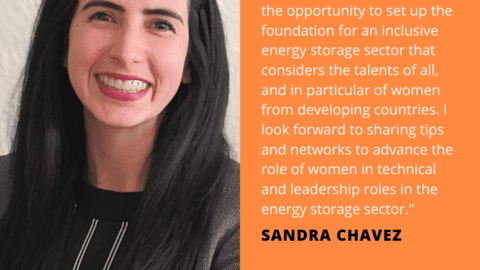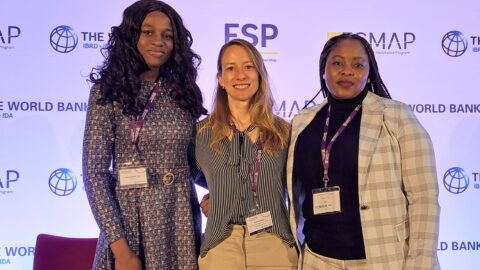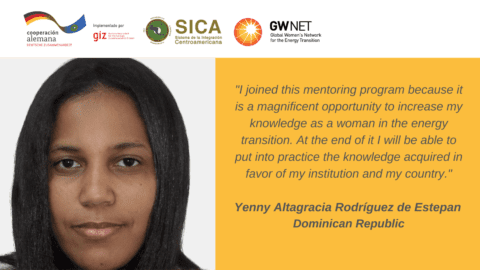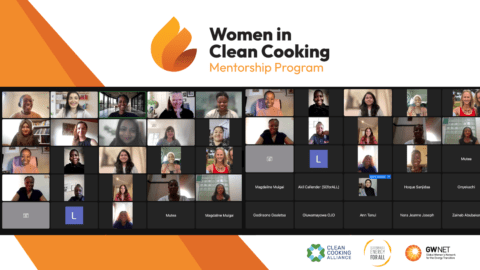To advance the role of women as agents of change in society and promote best practices within the energy storage sector, the Secretariat of the Energy Storage Partnership, hosted by the World Bank Energy Sector Management Assistance Program (ESMAP), is teaming up once again with the Global Women’s Network for the Energy Transition (GWNET) to launch a dedicated mentoring program for women working in the area of energy storage.
The newly launched program “Women in Energy Storage” based on the inaugural 2020-2021 program, aims to accelerate the careers of women in junior/middle management positions in the energy storage field, with the specific goals to:
- Increase women’s representation at managerial and decision-making levels, and ultimately advance the pace of the energy transition,
- Foster social change, facilitate novel ideas and encourage networking, and
- Support participants to develop concrete career goals which they can strategically work towards.
Call for mentees
The application criteria for participants are as follows:
- Must be a national from Africa (AFR), Middle East and Northern Africa (MENA), South Asia (SAR), Europe and Central Asia (ECA), or Latin America and the Caribbean (LAC) [i]
- Must be a woman working in the energy storage field
- Must work in a junior/middle management position
- 2 – 6 years of relevant work experience
Furthermore, the mentoring program is designed around the following key program parameters:
- 12-month program duration
- Comprehensive knowledge-transfer components
- Virtual networking and peer-to-peer exchange
If you fulfil all the application criteria and are interested to apply as a participant, please fill in the application form.
Call for mentors
The program is also looking for senior professionals working in the energy sector (preferably with energy storage experience) to serve as mentors and support the personal and professional development of participants.
If you are interested in volunteering as a mentor (which involves approx. 1 – 1.5 hours of engagement per month), kindly fill-in the Mentor Datasheet. The mentee-mentor pairing process will be based on how closely the goals of the mentee match the skills and experience of the mentor.
Kindly note that the programme will be carried out in English and professional working proficiency is required.
The deadline for applications is March 31st 2022
Please email questions to info@globalwomennet.org.
About
Energy Storage Partnership (ESP)
ESP is a global partnership convened by the World Bank Group to foster international cooperation to adapt and develop energy storage solutions for developing countries. Today, the unique requirements of developing countries’ grids are not yet fully considered in the current battery storage market – even though these countries may have the largest potential for battery deployment. Recognizing the need to catalyze a new market for batteries and other energy storage solutions in developing countries, ESP aims to promote a better understanding of energy storage solutions in developing countries by focusing on: Power systems and safety; Test beds for knowledge and capacity building; Testing protocols and validation of performance; Flexible sector coupling; Decentralized energy storage solutions and mini-grids; Procurement frameworks and enabling policies; and Recycling systems and standards. For more information, please visit our https://esmap.org/webpage/energy-storage-partnership-esp-factsheet and LinkedIn page.
Global Women’s Network for the Energy Transition (GWNET)
GWNET empowers women in energy through interdisciplinary networking, advocacy, training, and mentoring. GWNET seeks to address the current gender imbalances in the energy sector and to promote gender-sensitive action around the energy transition in all parts of the world. For more information, please visit www.globalwomennet.org.
Energy Sector Management Assistance Program (ESMAP)
ESMAP is a global knowledge and technical assistance partnership administered by the World Bank and funded by Australia, Austria, Canada, Denmark, the European Commission, Finland, France, Germany, Iceland, Italy, Japan, Lithuania, Luxembourg, the Netherlands, Norway, the Rockefeller Foundation, Sweden, Switzerland, and the United Kingdom, as well as the World Bank. ESMAP’s mission is to assist clients–low and middle-income countries–to increase know-how and institutional capacity to achieve environmentally sustainable energy solutions for poverty reduction and economic growth. For more information, visit our website: www.esmap.org.
[1] The World Bank’s regional categorization includes the following countries for the regions:
AFR: Angola, Benin, Botswana, Burkina Faso, Burundi, Cameroon, Cabo Verde, Central African Republic, Chad, Comoros, Cote d’Ivoire, Republic of the Congo, Democratic Republic of the Congo, Equatorial Guinea, Eritrea, Eswatini, Ethiopia, Gabon, Ghana, Gambia, Guinea, Guinea-Bissau, Kenya, Lesotho, Liberia, Madagascar, Malawi, Mali, Mauritania, Mauritius, Mozambique, Namibia, Niger, Nigeria, Rwanda, Sao Tome and Principe, Senegal, Seychelles, Sierra Leone, Somalia, South Africa, South Sudan, Sudan, Tanzania, Togo, Uganda, Zambia, and Zimbabwe.
MENA: Algeria, Bahrain, Djibouti, Egypt, Iran, Iraq, Jordan, Kuwait, Lebanon, Libya, Morocco, Oman, Qatar, Saudi Arabia, Syria, Tunisia, United Arab Emirates, West Bank and Gaza, and Yemen.
SAR: Afghanistan, Bangladesh, Bhutan, India, Maldives, Nepal, Pakistan, and Sri Lanka.
ECA: Albania, Armenia, Azerbaijan, Belarus, Bosnia and Herzegovina, Bulgaria, Croatia, Georgia, Kazakhstan, Kosovo, Kyrgyz Republic, Moldova, Montenegro, North Macedonia, Poland, Romania, Russian Federation, Serbia, Tajikistan, Turkey, Turkmenistan, Ukraine, and Uzbekistan.
LAC: Antigua and Barbuda, Argentina, Belize, Bolivia, Brazil, Colombia, Chile, Costa Rica, Dominica, Dominican Republic, Ecuador, El Salvador, Grenada, Guatemala, Guyana, Haiti, Honduras, Jamaica, Mexico, Nicaragua, Panama, Paraguay, Peru, St. Kitts and Nevis, St. Vincent and the Grenadines, St. Lucia, Suriname, Trinidad and Tobago, Uruguay, and Venezuela.











